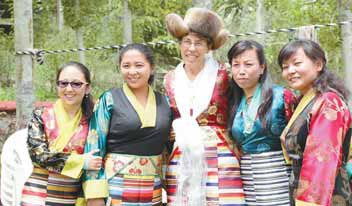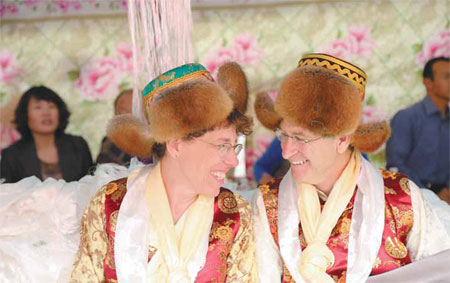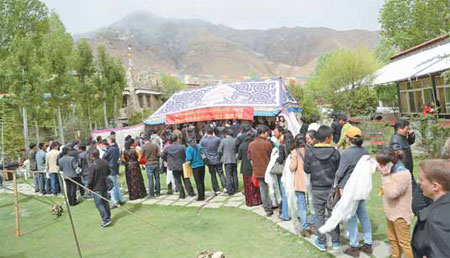More than a highland fling
Updated: 2013-06-04 07:25
By Tang Yue (China Daily)
|
||||||||
|
Bride Sharon Getter and groom Malcolm Mitchell at their wedding in Lhasa. Photos by Daqiong / China Daily |
|
Above: Most of the nearly 200 guests at the wedding are Getter's students in Lhasa. Below: Getter with her students from different years. |


Most visitors from abroad are tourists to a mystical land, but one man came to marry his sweetheart who had been living and teaching here for more than two decades. Tang Yue traces their romance in Lhasa.
It was a mixed-style wedding that was multilingual, with the guests chattering happily away in English, Mandarin and Tibetan. The bride and groom wore traditional Tibetan clothes with fur hats and their well wishes came bearing strips of the Tibetan "blessing silk", or hada.
It was May 11, and the wedding ceremony was being held at the Niangre Holiday Village in the northern suburb of Lhasa. Malcolm Mitchell, 55, had come all the way from San Diego to tie the knot with Sharon Getter, 54, an American who has been teaching English in the city since 1987.
Most of the nearly 200 guests were Getter's students and the rest were her colleagues at the Tibetan Academy of Social Sciences and her friends from the expat community living in Lhasa.
"I started crying because of all the love from my students. I am just a teacher. Not a big person. But so many people came and their love is very moving," says an emotional Getter, who was going back to the United States two days after the ceremony.
"It is very difficult to leave. This is where I have been living for many years. I love my students, love their sense of humor. It has been a fun place to live and to teach for more than 20 years."
Her husband was impressed by the love she received here.
"I'm very proud of her. This is my first visit to Tibet. I watched her speak the language, both Chinese and Tibetan. She has so many friends from different professions and different levels of education, from the very high level all the way down to very simple people, but they all have mutual respect."
Getter started teaching English at Jiangxi University in East China in 1985. And when there was a chance to teach in Lhasa, she signed up at once.
"It was very hard but it was very exciting. Our house didn't have water, didn't have a toilet. But it didn't matter. I had to teach by candlelight sometimes. The situation has changed, and it is much easier but I enjoyed the simple life at that time because they needed me and we became very good friends," she says.
Her first students in Lhasa were researchers at the academy. Later her classes expanded to include people from around the city and entire region.
"We had monks, nuns, business people and nomads. They come from nomad families and they want to have a better life in Lhasa, so their parents send them here. Many come without a very high education and they come to learn Tibetan, Chinese and English and hope to get a better job," says Getter, who has taught more than 3,000 students in Tibet.
"Han people are good at grammar while Tibetan people are very oral and learn to speak very quickly. Tibetan people are very fun-loving, not so shy, and Han students are shy and sometimes afraid to speak."
Drolkar, 30, learned English with Getter for two years from 2006 and then went on to college to continue her study.
"She was the most interesting teacher I have ever met. She doesn't only talk, she sings, dances and performs. It makes learning English so much fun," says Drolkar, now a sales manager with a handicraft company.
For Geyang, Getter's attitude toward life is more impressive than her teaching skill.
"She loves hiking in the mountains and taking photos of flowers. She makes calendars herself and gives them as gifts to friends. She is so inspiring with her passion for life," says the teacher at the Tibetan Traditional Medical College. Getter taught Geyang in 1998 and they have stayed friends since.
It is one thing to visit a beautiful place like Lhasa or stay a year or two, but it is quite another to live and work at the place for more than 20 years.
"Because I love long-term relationships," Getter says, explaining her choice.
"Teaching at the university in the US wasn't very satisfying because my students came and went so quickly. But here my students are my friends," says Getter, who received the National Friendship Award by then Premier Wen Jianbao in 2009.
Her love for her students and the land also helped her win the heart of Malcolm, whom she met online about one year ago.
"I could not be very happy with someone who just wanted to keep house. But first and most importantly, I was very impressed by the fact that she has been here for so long. It shows commitment, that she can stick with something. Even though it's hard, she won't give up," he says.
Getter says although she was going back home, she would apply for short-term teaching posts in Tibet during the summer vacation and to visit her friends in Tibet.
"It's not the material things. It's not about cars, or about money. It's about developing yourself as a person. I think the American dream is wrong that everybody has a house and a car. We should develop our hearts," she says. And that is Getter's Chinese dream.
Contact the writer at tangyue@chinadaily.com.cn.
(China Daily USA 06/04/2013 page9)

 Michelle lays roses at site along Berlin Wall
Michelle lays roses at site along Berlin Wall
 Historic space lecture in Tiangong-1 commences
Historic space lecture in Tiangong-1 commences
 'Sopranos' Star James Gandolfini dead at 51
'Sopranos' Star James Gandolfini dead at 51
 UN: Number of refugees hits 18-year high
UN: Number of refugees hits 18-year high
 Slide: Jet exercises from aircraft carrier
Slide: Jet exercises from aircraft carrier
 Talks establish fishery hotline
Talks establish fishery hotline
 Foreign buyers eye Chinese drones
Foreign buyers eye Chinese drones
 UN chief hails China's peacekeepers
UN chief hails China's peacekeepers
Most Viewed
Editor's Picks

|

|

|

|

|

|
Today's Top News
Shenzhou X astronaut gives lecture today
US told to reassess duties on Chinese paper
Chinese seek greater share of satellite market
Russia rejects Obama's nuke cut proposal
US immigration bill sees Senate breakthrough
Brazilian cities revoke fare hikes
Moody's warns on China's local govt debt
Air quality in major cities drops in May
US Weekly

|

|









